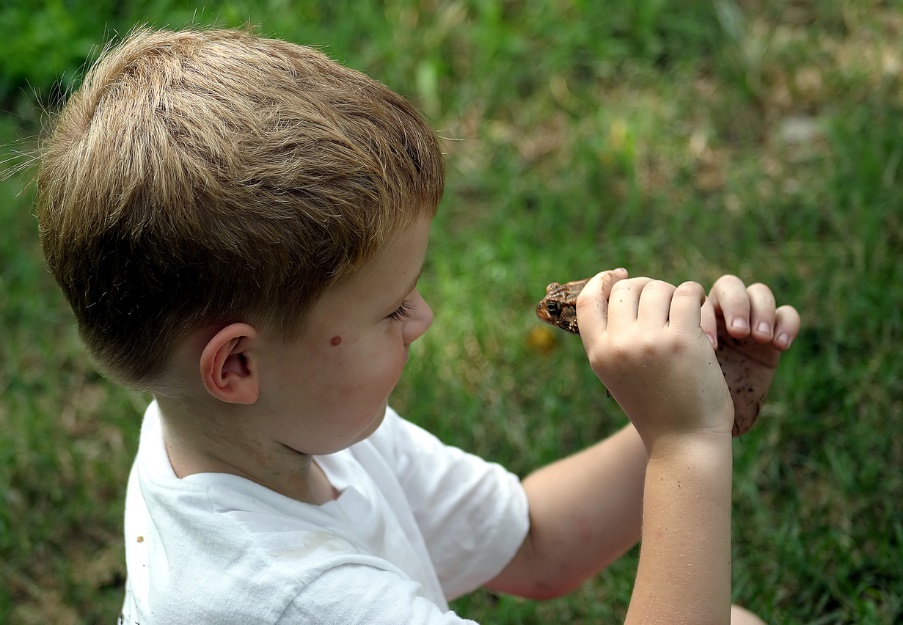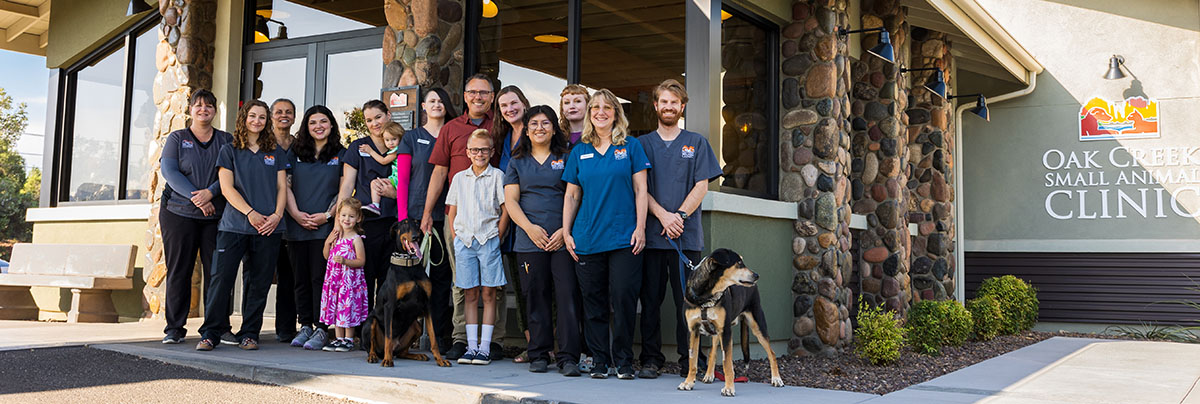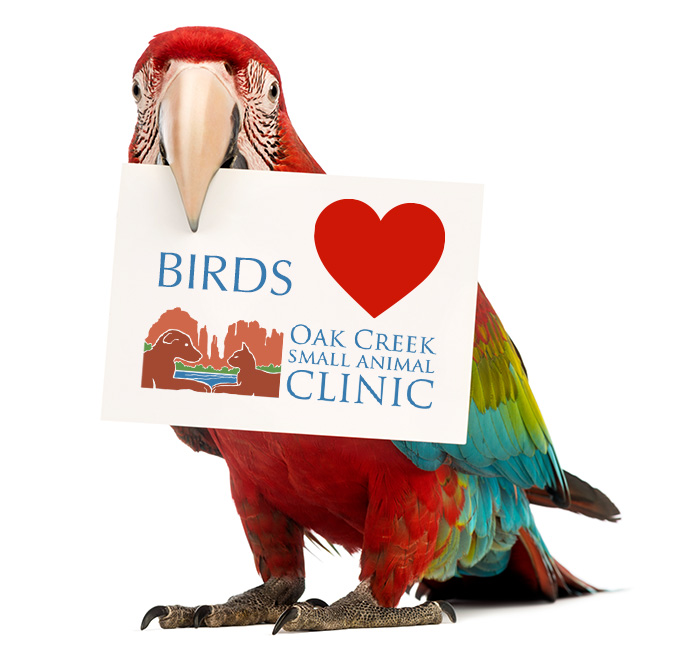Oak Creek Small Animal Clinic | Sedona, AZ
At Oak Creek Small Animal Clinic in Sedona, AZ, we care for a wide range of animals—including dogs, cats, avian and exotic pets, and backyard chickens. Pets bring joy, companionship, and enrichment to our lives, but they can also carry diseases that spread to humans. These are known as zoonotic diseases and understanding them helps keep both your household and animals safe.
What Are Zoonotic Diseases?

Zoonotic diseases are illnesses that can be passed from animals to people. Transmission may occur through saliva, urine, feces, fur, feathers, skin, or contaminated environments. While some are mild, others can cause serious illness—particularly in children, seniors, pregnant individuals, and those with weakened immune systems.
At Oak Creek Small Animal Clinic, we are committed to helping you prevent these diseases with client education, thorough preventive care, and guidance on safe animal interactions.
Common Zoonotic Diseases in Dogs and Cats
1. Roundworms & Hookworms (Toxocariasis)
- Animal Symptoms: Bloated belly, vomiting, diarrhea, weight loss, worms in stool
- Transmission in Animals: Ingestion of contaminated soil, feces, or from mother
- Transmission to Humans: Contact with contaminated soil, pet fur, or feces
- Human Symptoms: Rash, coughing, vision problems, internal organ damage
2. Ringworm (Dermatophytosis)
- Animal Symptoms: Itchy, flaky skin; circular areas of hair loss
- Human Symptoms: Ring-shaped red rash
- Spread: Direct contact with infected fur, bedding, or grooming tools
3. Giardia (Giardiasis)
- Animal Symptoms: Diarrhea, weight loss, greasy stool
- Human Symptoms: Gas, cramping, diarrhea
- Spread: Contact with infected feces or water
4. Leptospirosis
- Animal Symptoms: Vomiting, fever, muscle pain, jaundice, kidney/liver damage
- Human Symptoms: Flu-like symptoms, liver/kidney complications
- Spread: Contact with infected urine or water sources (including puddles)
5. Cat Scratch Disease (Bartonellosis)
- Animal Symptoms: Often no symptoms in cats
- Human Symptoms: Swollen lymph nodes, fever, fatigue
- Spread: Bites, scratches, or licks from infected cats
What About Pregnancy and Cat Scratch Disease?
From time to time, concerns arise—often shared by word of mouth or on social media—that cat scratch disease can lead to miscarriage. While these fears are understandable, especially during pregnancy, current research does not support this idea.
Cat scratch disease is typically mild and not considered a significant risk during pregnancy. Unlike toxoplasmosis, it has not been clearly linked to miscarriage or birth defects. One study looked specifically at pregnant women diagnosed with cat scratch disease and found no strong evidence that the infection harms unborn babies. You can view the study summary here: PubMed – Cat Scratch Disease in Pregnancy.
If you are expecting and concerned about your pet cat, it’s still wise to avoid scratches and bites, keep up with flea prevention, and practice good hygiene.
6. Rabies
- Animal Symptoms: Behavioral changes, aggression, drooling, paralysis
- Human Symptoms: Neurological issues, fatal if untreated
- Spread: Bite or saliva from infected animal
7. Plague (Yersinia pestis)
⚠️ Note: A recent fatal case of pneumonic plague occurred in July 2025 in Flagstaff, AZ. Although rare, plague is present in the Western U.S., including Nevada. Without immediate treatment, up to 60% of untreated people and animals with bubonic plague may die, and pneumonic plague can be fatal within days. If your pet shows signs of illness after flea exposure or hunting wildlife—or if you develop fever and swollen lymph nodes—seek emergency veterinary or medical care immediately. Early treatment saves lives. Learn more at CDC.gov/plague.
- Animal Symptoms: Cats may develop fever, swollen lymph nodes, coughing, nasal discharge, or lethargy; dogs are usually asymptomatic but may carry infected fleas
- Transmission (Animal): Flea bites from infected wild rodents (e.g., prairie dogs, ground squirrels); cats may also be infected by hunting or eating infected animals
- Transmission to Humans: Flea bites, contact with infected tissues or fluids, or respiratory droplets from infected cats (pneumonic plague)
- Human Symptoms:
- Bubonic plague: Swollen lymph nodes, fever, chills
- Pneumonic plague: Cough, chest pain, difficulty breathing
Zoonotic Risks in Birds and Backyard Chickens
1. Salmonella
- Animal Symptoms: Often none; sometimes diarrhea or low egg production
- Human Symptoms: Fever, diarrhea, abdominal cramps
- Spread: Contact with birds, eggs, or contaminated surfaces
2. Avian Influenza (Bird Flu)
- Animal Symptoms: Respiratory issues, sudden death, swelling
- Human Symptoms: Respiratory illness, fever, body aches
- Spread: Close contact with infected birds, droppings, or shared water
3. Campylobacter
- Animal Symptoms: Often none
- Human Symptoms: Diarrhea (sometimes bloody), fever, abdominal pain
- Spread: Handling raw poultry or contaminated surfaces
4. Psittacosis (Parrot Fever)
This disease is primarily associated with parrots, cockatiels, budgerigars, and other psittacine (parrot-type) birds. While rare, there have been a few isolated reports of Chlamydia psittaci in non-psittacine birds like chickens, but it is not considered a common or notable risk from backyard flocks.
- Animal Symptoms: Lethargy, nasal/eye discharge, breathing issues
- Human Symptoms: Flu-like symptoms, pneumonia
- Spread: Inhalation of dried droppings or feather dust
Zoonotic Diseases in Exotic Pets
1. Salmonella (Reptiles & Amphibians)
- Carriers: Turtles, lizards, snakes, frogs
- Animal Symptoms: Usually none
- Human Symptoms: Fever, diarrhea, stomach cramps
- Spread: Contact with animal or habitat
2. Tularemia (Rabbits)
- Animal Symptoms: Fever, swollen lymph nodes, lethargy
- Human Symptoms: Skin ulcers, fever, swollen lymph nodes
- Spread: Handling infected rabbits or insect bites
3. Rat-Bite Fever
- Carriers: Rats, mice, gerbils
- Animal Symptoms: Often none
- Human Symptoms: Fever, muscle aches, vomiting, rash
- Spread: Bites, scratches, or handling infected rodents
4. Hantavirus
- Carriers: Wild mice (especially deer mice)
- Animal Symptoms: None
- Human Symptoms: Fatigue, fever, respiratory distress
- Spread: Inhalation of particles from droppings or bedding
5. Leptospirosis (Pet rats, but rare)
Leptospirosis is more common in wild rodents and environments contaminated by them (e.g., standing water, bedding, feed).
Healthy, well-kept pet rodents in clean indoor environments are at very low risk of contracting or spreading leptospirosis.
Zoonotic risk from rodents generally comes more from wild exposure or poor sanitation than from the species itself.
- Animal Symptoms: Often none in affected pets
- Human Symptoms: Flu-like illness, and in some cases, kidney or liver complications
- Spread: Contact with urine-contaminated bedding, surfaces, or water
How to Help Prevent Zoonotic Disease
You can protect your family and pets with a few consistent practices:
Hygiene
- Wash hands after handling animals or waste
- Wear gloves when cleaning cages, litter boxes, or coops
- Teach children safe pet hygiene
Clean Environment
- Disinfect enclosures and bedding regularly
- Keep food and water sources clean
- Ventilate pet areas to prevent mold and bacterial buildup
Pest Control
- Keep wild animals and rodents away from pet enclosures
- Do not allow pets to roam unsupervised
- Report unusual wildlife behavior to authorities
Safe Handling
- Avoid letting pets lick your face or wounds
- Supervise children during pet interactions
- Use protection during high-risk activities like assisting with births
Veterinary Care
- Stay up to date on vaccinations like rabies and leptospirosis
- Follow deworming and flea/tick control protocols
- Schedule regular wellness exams and isolate sick animals
Compassionate, Preventive Pet Care in Sedona

At Oak Creek Small Animal Clinic, we are proud to serve families and pet lovers across Sedona and the surrounding area. Whether you have a curious cat, a backyard flock, a loyal pup, or a unique exotic pet, our experienced team is here to help you manage disease risks and keep your household healthy. We are dedicated to providing gentle, thorough veterinary care for animals of all kinds.
Call us today to schedule a wellness visit or learn more about zoonotic disease prevention.




